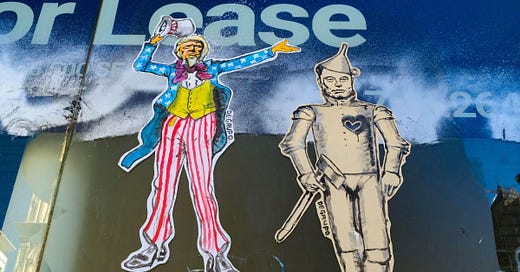
Discover more from REACTION
We all know that the world changed last Tuesday; but that is about all we do know. Trump’s election leaves us none the wiser about many things, including whether he meant what he said during the campaign about protectionism and NATO, the two questions that probably matter most to us British. However, we might also ask ourselves something else: what will be the effect of America’s political earthquake on the voters of the European Union?
It is possible that EU electorates will react against the Trumpist tide and, in sheer self-defence, integrate more closely, to the delight of Mr.Juncker, President Hollande and Mrs. Merkel. That may, however, not be the way to bet.
There is already a populist tide running in Italy, in France, in Holland, in Sweden and, to a lesser degree, in Germany. The conventional wisdom is that however well the populists do they will not do well enough to prevent the more mainstream parties combining to deny them entry to government. So, if in France next year Marine Le Pen makes it into the second round, we assume that the mainstream left will swing behind M. Juppe and deny Le Pen the Elysee.
Each country is different,but the 4th of December may give us an indication of how Trump’s triumph is affecting European politics; and of what might happen in next year’s French, German and Dutch elections, events which will make 2017 a huge year in the history of Europe and of the EU. Why? Because, on 4th December, both Italy and Austria go to the polls, Italy in a constitutional referendum and Austria in a re-run of its flawed May 2016 presidential election. The results of both polls will indeed give us some pointers to the way the EU is swinging, but they may also themselves influence the outcomes of the 2017 elections in neighbouring countries.
The British press has shown an intermittent interest in the Italian referendum which the Italian Prime Minister may well lose. (He began by saying he would resign if he lost, bu now that he is consistently behind in the polls he has retracted that undertaking, whether to the relief of his electorate or not is as yet unclear).
What, however, is very curious is the complete lack of interest from Fleet Street in the Austrian poll. Its significance may well be even greater than that of the Italian referendum, since Austria plays a pivotal role in the refugee disaster because of its place on the map; and the current leader in the opinion polls has shown an interest in an idea which must be giving nightmares to Mr. Juncker and the purists of the doctrine of free movement of peoples. His idea is to create a ” union within a union” to operate a more restrictive asylum policy than the rest of the EU. Its members might be Austria,Hungary,Croatia and the Czech Republic,thereby, and incidentally,beginning to fulfil the late Dr.Otto Hapsburg’s dream of rebuilding the Austrian-Hungarian empire. In other words, could this Austrian election lead to the next phase of the refugee crisis? Is its role to be a catalyst for the implosion of the European Union?
Hitherto, the Austrian president’s role has been seen as purely ceremonial. He officially appoints the Chancellor, but only as directed by the results of national elections. Otherwise, he is supposed to embody the spirit and dignity of the nation, something that not all incumbents have succeeded in doing. The president, however, does have one power: he or she can dissolve the National Council and so precipitate an election. The current leader in the opinion polls, who is a populist, has threatened to do just that. Should he win and carry out his threat, his populism might all too easily be reflected in the subsequent election result.
The polls suggest that the presidential race is close, but we have heard that before and the history of this extended and farcical election should give the populists hope even if there were no Trump coat tails effect.
The first round took place on 24th March this year. The result humiliated the centre left and centre right who had carved up Austrian politics between them since the war. The winners were one Norbert Hofer of the FPO, or Freedom Party, with 35 per cent and one Alexander Van der Bellen of the Austrian Greens with 21 per cent. Some mauvaises langues have suggested that Hofer represents an unpleasant extreme right and that Van der Bellen is a “water melon”, green on the outside, but red in the middle.
In the second round, Hofer led before the absentee votes were counted with 51.9 per cent. However, after the absentee votes came in, it was found that Van der Bellen had won by about 31,000 votes. The results included some curious statistics. For instance, in Waidhofen an der Ybbs 146.9 per cent of the electorate were found to have voted and there were some oddish results too in Linz.
Hofer appealed to the Constitutional Court which ordered a rerun on the grounds that the absentee votes had been improperly counted. You will be relieved to hear that the court expressly made no allegations of electoral fraud. The rerun was originally scheduled for 2nd October, but had to be postponed by Parliament on the gravest of grounds: the seals on the postal votes would not gum up.
We do not know nowadays whether to believe opinion polls, but it is perhaps not altogether surprising that at the moment Hofer appears to enjoy a narrow lead. Naturally, we cannot tell how many shy votes there are for Hofer, so if Brexit and Trump are anything to go by, his lead may be even more convincing.
We are obsessed with examining our own navels in the matter of Brexit and we all too easily forget the hole the EU is in. The Austrian election is an outward and visible sign of it. Whether Brussels in its present form can survive the potential hammer blows that the various polls in December of this year and in 2017 may deliver, or whether another banking or currency crisis will make matters even worse,we will soon find out. For our part their troubles are hardly going to do us much good either.
Whatever happens,an independent UK under a sovereign parliament, with strong defences, outward-looking and free-trading may be just the friend our neighbours need.
Subscribe to REACTION
Iain Martin and the team make sense of the news, providing commentary and analysis on the stories that matter in politics, geopolitics, economics and culture.











